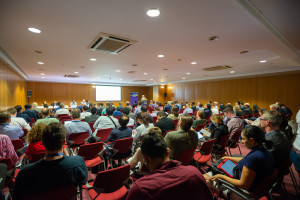Bioenergy production and use can make a valuable contribution to the sustainable development agenda. With careful management, various forms of bioenergy can help countries meet growing energy demand while concomitantly realizing carbon emissions reductions, climate change mitigation and adaptation efforts and improvements to citizens’ livelihoods. These benefits are best obtained through effective monitoring, research and information sharing as they support the development of comprehensive national bioenergy policies. In this context, the sustainability of bioenergy has been approached in different ways and by different initiatives and organizations.
In order to facilitate the sharing of experiences and lessons learned and to raise awareness regarding the joint effort towards sustainable development of bioenergy in Africa, GBEP has organized, in collaboration with IEA Bioenergy and ETA-Florence Renewable Energy, a side event to the 27th EUBCE 2019 in
Lisbon – Portugal. The event, entitled “Tracking Sustainable Bioenergy Development: Focus on Africa”, brought together representatives of relevant international agencies (e.g. ECREEE, AFREC, GIZ) that boast a long term experience on biomass, bioenergy and bioeconomy monitoring, planning and development in Africa.
The presentations given by the four keynote speakers are summarized below.
Uwe Fritsche, Scientific Director, IINAS, gave a global vision on bioenergy and introduced the work of the new IEA Bioenergy Task 45 (Climate and sustainability effects of bioenergy within the broader bioeconomy). He highlighted that 15 out of 17 SDGs are directly or indirectly linked to bioenergy. He described the contents of the IEA Technology roadmap, with a focus on the key role that bioeconomy has to achieve targets settled under the Paris agreement. The roadmap explicitly mentions the key contribution of bioenergy in the bioeconomy and addresses the issue of biomass sustainability.
Maria Michela Morese, Executive Secretary of GBEP, gave an overview of the role of GBEP, which was established in 2006 to support “biomass and biofuels deployment, particularly in developing countries where biomass use is prevalent”. GBEP has two principle priorities: to facilitate the sustainable development of bioenergy and the development of capacities for sustainable bioenergy. GBEP is actively working on the diffusion of sustainability in the processes of production and use of bioenergy resources with several activities and tools, including the GBEP Sustainability Indicators for Bioenergy, developed in 2011, and the related Implementation Guide. She stressed the interlinkages between bioenergy and the 2030 Agenda, along with commitments towards the Paris Agreement.
Rocio A Diaz Chavez, Stockholm Environmental Institute in Nairobi, presented the results of the recent implementation of the GBEP Sustainability Indicators in Kenya. She highlighted that the major challenges encountered while measuring the GSI in Kenya was related to combine existing data, abundantly provided by various organization (e.g. GIZ, SNV, AECF), in an unique and comprehensive bioenergy database. Such type of database is key to allow for continuous monitoring of the bioenergy sector, thus facilitating the settlement of new policies to foster its development.
Abdoulaye Oueddo, Energy Information System Expert, AFREC, spoke about the AFREC Bioenergy Database as a source of bioenergy data and explained its main opportunities and challenges. In Africa biomass is still the most important energy source and covers the 85 percent of energy consumption in the residential sector. Cooking is the mainly end-use of biomass, but it is difficult to get a proper breakdown of other types of biomass consumption. Bioenergy brings multiple benefits beyond energy supply, hence, it is important to get a detailed picture on the full bioenergy situation in the continent. He concluded by presenting the joint initiatives between AFREC and GBEP, with the objective to set up a strong system of continuous monitoring of the bioenergy sector in African countries, through the implementation of the GSI, with a view to propose tailored recommendation and policies for each country to improve the sustainability of bioenergy production and consumption.
Initial presentations represented the starting point for an interactive discussion on the theme “Addressing bioenergy data collection challenges in Africa”, with inputs from Olivier Dubois, FAO; Bah Saho, ECREEE; Charlie Moosmann, GIZ; and Floor van der Hilst, Utrecht University, The Netherlands and IEA Bioenergy, Task 45.
Below are the main take home messages from the final roundtable discussion:
- Bioenergy can significantly contribute to meet the targets of the 2030 Agenda, along with commitments towards the Paris Agreement;
- Sustainability is key;
- Monitoring the sustainability of the national bioenergy sector is necessary to understand, evaluate and improve the performances of the sector;
- Create cross cutting, comprehensive and consistent database on bioenergy is fundamental to promote sector’s development; and
- Joining forces of multilateral international agencies is key to optimize the use of limited financial resources, thus accelerating the progress towards universal energy access (SDG7), achievement of climate goals (SDG13) and reduced air pollutant emissions (part of SDG 3).
All presentations and document related to this event are available on the official GBEP website.
Text by Maria Michela Morese, GBEP



